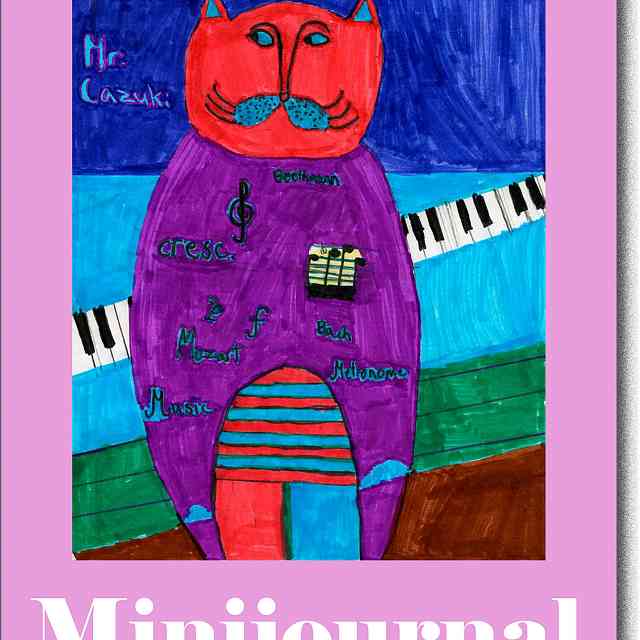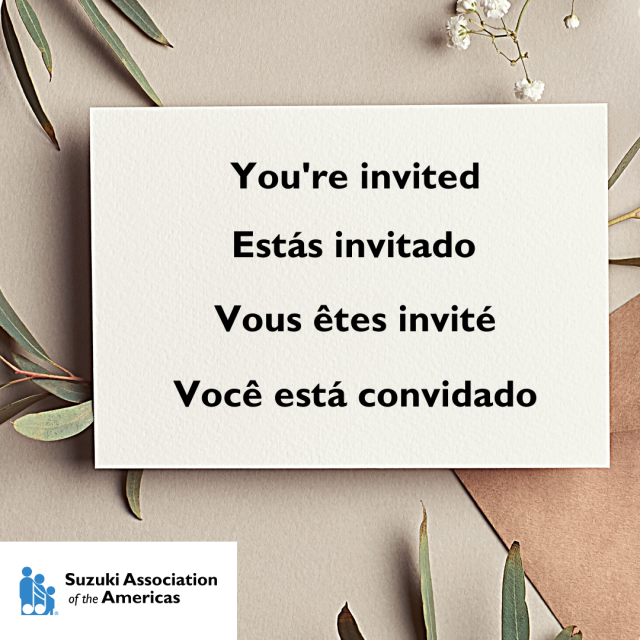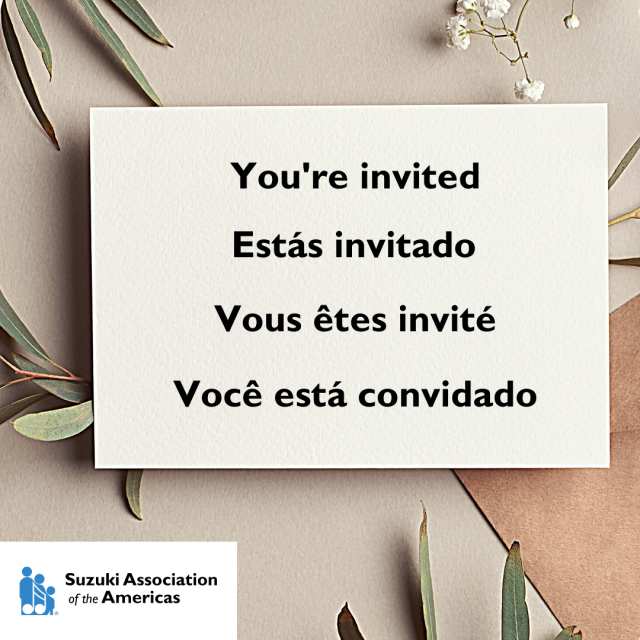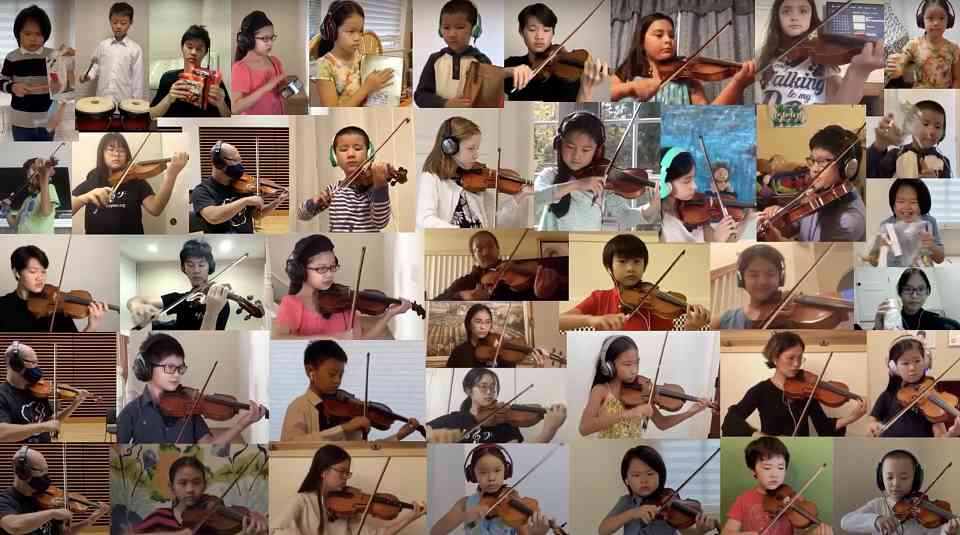
Students perform an excerpt from “Toy Symphony” by Edmund Angerer in a video mashup concert.
The COVID-19 pandemic has caused hardship for so many families since it began ravaging the world last winter. Priorities naturally shifted for many teachers, families, and Suzuki alumni. For some, music became more of a respite than ever before, bringing moments of joy to an otherwise painful year. For others, music became an impossible addition to a list of ever-growing demands. We know that Dr. Suzuki’s mission was duplicitous: to grow both good musicians and good citizens. Regardless of what musical progress did or did not happen this year, our Suzuki community’s beautiful hearts grew leaps and bounds.
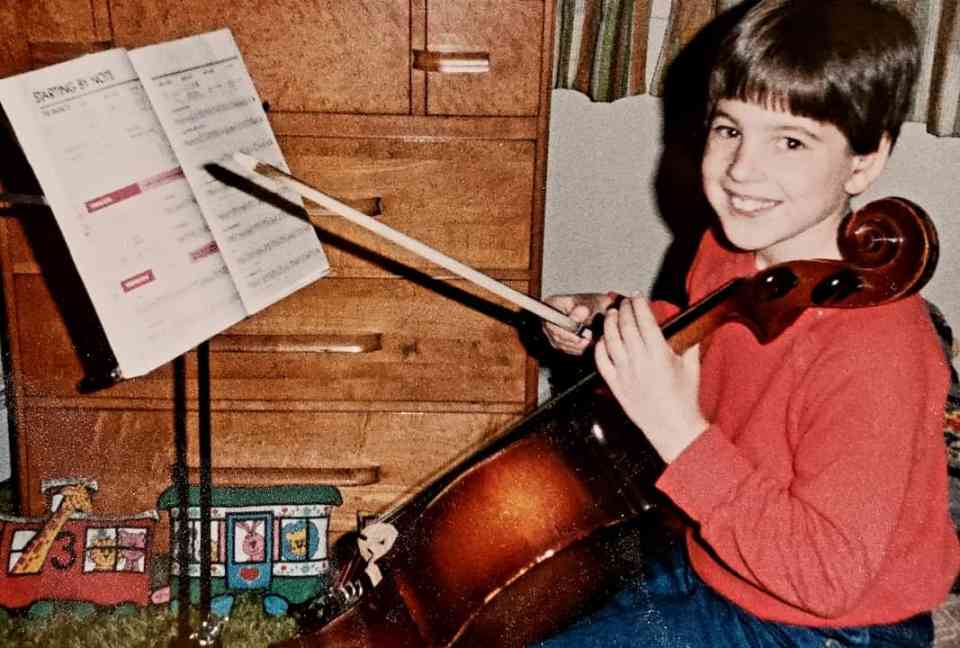
Adam Schwalje as a cellist, before falling in love with the bassoon.
Adam Schwalje, resident physician and research fellow in the Department of Otolaryngology at the University of Iowa Hospitals and Clinics
Doctor Adam Schwalje’s days start at 3:00 a.m. He wakes up, gathers information on his patients as he eats breakfast, and heads over to the hospital where he puts on his personal protective equipment. With his N95 mask and wraparound safety glasses, he begins his rounds before heading off to the operating room or clinic.
By specializing in patients who have ear, nose, and throat issues, Schwalje found himself on the frontlines of the COVID-19 pandemic. Since the virus became more prevalent in Iowa, Schwalje’s work involves giving a lot more tracheostomies: a procedure where he creates an airway for a patient with difficulty breathing.
“The danger of exposure to COVID-19 is very real,” Schwalje said.
Schwalje credits his Suzuki upbringing with his success in the emergency room. Technically, learning an instrument helped him develop the fine motor skills he uses for surgeries. Many of the residents in Schwalje’s hospital are also Suzuki students, who say the method helped them with both dexterity and grit.
At a foundational level, understanding music-making through the Suzuki method taught him “to imagine how things can be better,” Schwalje said. In that way, Suzuki was “practice for life.”
Schwalje began the Suzuki method when he was in the third grade. He started out on cello, then joined the choir, and started playing the bassoon and saxophone.
He didn’t let his hearing impairment stop his love for music as a child. And Schwalje was inspired reading Dr. Suzuki’s writings that emphasized that the method welcomed all students, even those “you wouldn’t necessarily think could even participate.” In the Suzuki method, Schwalje found a community. He still has lasting friendships with the people he met through the method.
Although his days are hard, what’s getting Schwalje through is thinking about being able to “get together and play some music with people again,” Schwalje said.

Lisa Vosdoganes and her daughters performing.
Lisa Vosdoganes, Suzuki cello teacher
Lisa Vosdoganes and her two children have done quarantine flash mobs in superhero costumes, holiday pajamas, and special hats. They’ve had guest stars – both surprise and invited – including their dog, Ringo, lawnmowers, and inflatable snowmen.
The flash mobs, which she initially envisioned as a one-off event, were a way to stop the days from “blurring together,” Vosdoganes said. “In March, everybody was in this sort of disoriented funk,” she said. “Even my really motivated students and parents were saying ‘we just don’t know what to do.’”
So Vosdoganes planned a flash mob for the Parker Elementary School in Houston, Texas, on a Monday at 10:00 a.m. At first, just a couple of community members joined. They stepped out onto their yards and opened Vosdoganes’ Facebook Livestream to follow along. Eventually, students from other schools joined, and students from other states, countries, and continents. “We had like 1,000 kids playing in their yard,” Vosdoganes said.
The flash mobs were “a way to help parents at least have one day a week where they didn’t have to force their kids to practice.
It wasn’t just the kids and parents who benefited—it was their neighborhoods, too. People in Vosdoganes’ town started planning their walks around flash mob time. With tears streaming down their faces, many neighbors have told Vosdoganes that the flash mob “got them through this pandemic.”
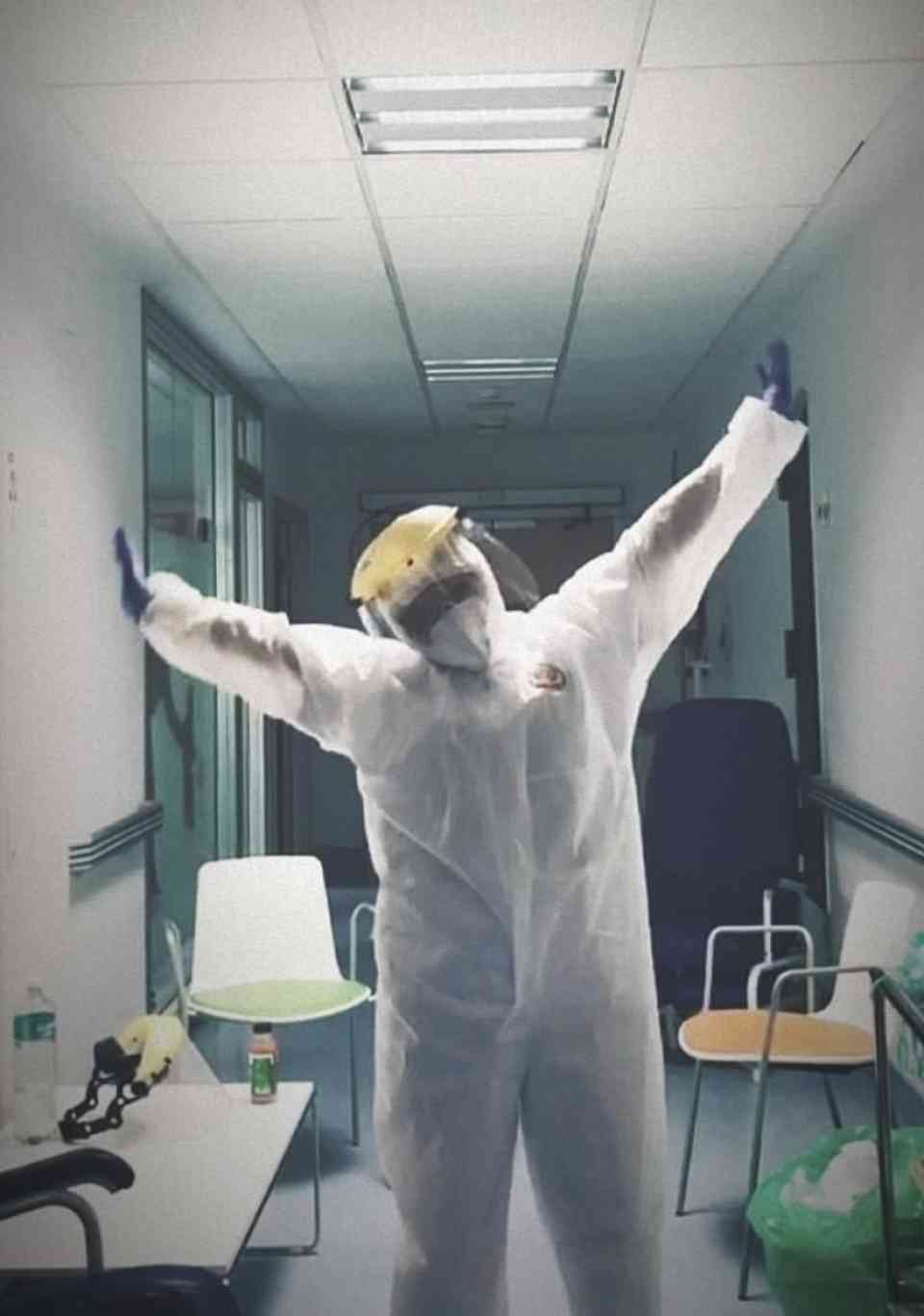
Sara Gil Cubas stays positive while working as a frontline nurse.
Sara Gil Cubas, pediatric nurse
Sara Gil Cubas, who works in an intensive care unit in Spain, said that the Suzuki method taught her that “with perseverance and hard work, you can achieve whatever you set out to do.” Gil Cubas started playing piano when she was 13 years old, following her mother’s lead, who also plays the piano.
Nursing school was no small feat for Gil Cubas, but the Suzuki method helped her by both providing a way to “relax and distract myself when everything was overwhelming me,” and teaching her about patience. “If you want to do something, you can do it, no matter how old you are. With work and perseverance, everything can be reached,” Gil Cubas said.
Because of the COVID-19 pandemic, Gil Cubas’ nursing residency was suspended. Instead, she is working as a COVID-19 frontline nurse. “It was very hard because, in addition to losing part of my training, it was a totally unknown job for all of us,” Gil Cubas said, leaving her “misplaced and overwhelmed.”
Watching sick patients struggle without families to support them has been the hardest part for Gil Cubas. She took to volunteering her cell phone so families could have a chance to “connect with their loved ones through a video call.”
At home, music is a welcome break for Gil Cubas. It allows her to “disconnect, be at peace, and be able to continue with the day-to-day in an easier way,” Gil Cubas said.
Gene Wie, chief technology officer of The Musissho Project
Rather than shutting down completely when the pandemic hit, Gene and Chika Wie chose to adapt. At the time, they were directing the Community Youth Orchestra of Southern California, which had a Suzuki group class component twice a week. The couple wanted to “give kids around the world that safe social space to continue their music-making,” so they took the group class experience online, Gene said.
Every Saturday, students from around the world log on to share music with each other. They register for free on the Musissho website, gaining access to the Zoom link as well as the repertoire list and schedule for play-ins. “In each session, Chika leads each piece accompanied by a custom symphonic backing track,” Gene said, which he creates by making new arrangements of works that are in the public domain. The result is “exciting backing music for play-ins, which students look forward to hearing each week,” he added.
Students keep their microphones off and play along with Chika, “who is streaming the backing track and her own playing live to every student,” Gene said. Students remain engaged, voting on what tempo they’d like to perform each piece after an initial play-through and making their own requests for pieces to play once they finish the repertoire list.
At its peak over the summer, Gene and Chika had more than 150 families registered, with 25-40 students per play-in. Lately, they have had fewer students participate, “but we expect it will slowly grow again,” Gene said.
“We are so grateful to have made new connections with so many teachers and families and inspiring young people during this time through the play-ins,” Gene said. “We continue to develop our materials so that in the near future, we can assist teachers with launching their own play-in events.”
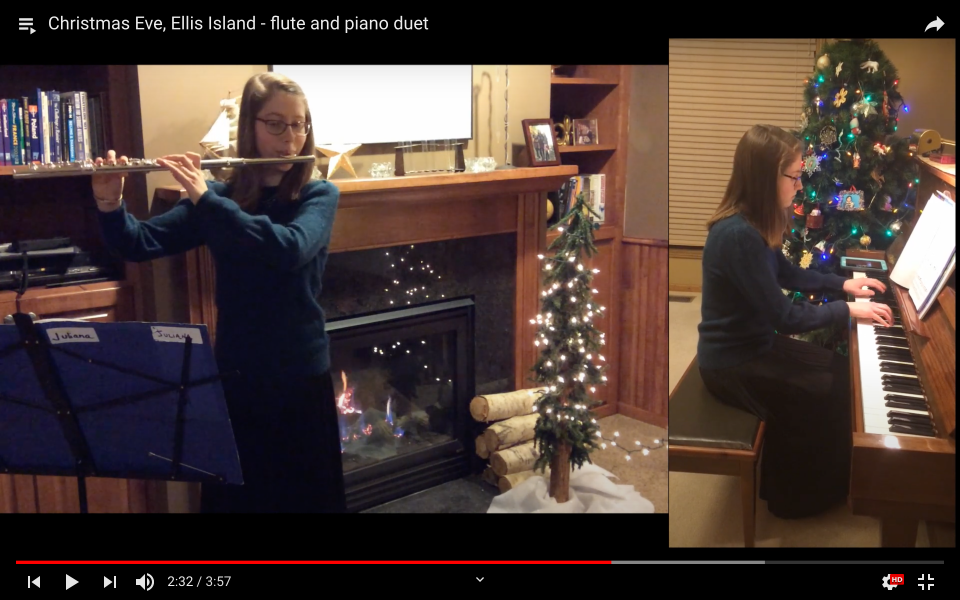
Vanamali Medina’s students showcase their talent online.
Vanamali Medina, Suzuki flute teacher
Vanamali Medina’s students needed a way to connect with their friends and loved ones as the pandemic wore on longer than anyone could have expected. She created a virtual holiday card-making project with her studio to “bring healing and connection to loved ones and show the students that their musical ‘gift’ is truly worth giving, Medina said.
Students recorded their playing and chose to perform along with a YouTube backing track, create a multitrack piece themselves, or play with a family member. Some chose their favorite songs or special family songs, and others went with more traditional holiday music. The result was a mix of cards featuring duets with family members across the country from one another, students self-accompanying, and even “a dancing ferret puppet and gymnastics,” Medina said.
The families in Medina’s studio had glowing reviews. “One mother told me it was an ‘international sensation’” for their family, which is spread across several continents. Medina’s daughter shared her card on a community forum and “got a flood of appreciative notes.” For many community members, the cards were the closest thing to a concert they had experienced since the pandemic started.

